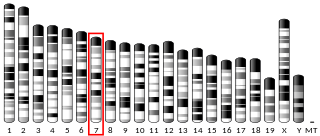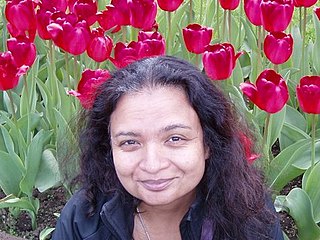Related Research Articles
Tom Maniatis, is an American professor of molecular and cellular biology. He is a professor at Columbia University, and serves as the Scientific Director and CEO of the New York Genome Center.

B-lymphocyte antigen CD19, also known as CD19 molecule, B-Lymphocyte Surface Antigen B4, T-Cell Surface Antigen Leu-12 and CVID3 is a transmembrane protein that in humans is encoded by the gene CD19. In humans, CD19 is expressed in all B lineage cells. Contrary to some early doubts, human plasma cells do express CD19, as confirmed by others. CD19 plays two major roles in human B cells: on the one hand, it acts as an adaptor protein to recruit cytoplasmic signaling proteins to the membrane; on the other, it works within the CD19/CD21 complex to decrease the threshold for B cell receptor signaling pathways. Due to its presence on all B cells, it is a biomarker for B lymphocyte development, lymphoma diagnosis and can be utilized as a target for leukemia immunotherapies.

CD22, or cluster of differentiation-22, is a molecule belonging to the SIGLEC family of lectins. It is found on the surface of mature B cells and to a lesser extent on some immature B cells. Generally speaking, CD22 is a regulatory molecule that prevents the overactivation of the immune system and the development of autoimmune diseases.

Harald von Boehmer was a German-Swiss immunologist best known for his work on T cells.
Timothy "Tim" A. Springer is an immunologist and the Latham Family Professor at Harvard Medical School. He is also a professor at the Department of Biological Chemistry and Molecular Pharmacology and of the Division of Medical Sciences, and a Senior Investigator at the Research Program in Cellular and Molecular Medicine of the Boston Children's Hospital. Springer is best known for discovering the first integrins, LFA-1, and intercellular adhesion molecules (ICAMs), and for elucidating how these cell adhesion molecules function in the immune system. In recent years, Springer's research interest has expanded to malaria, transforming growth factor beta (TGF-β) signaling, and von Willebrand factor.
Robert F. Siliciano is a professor of medicine at the Johns Hopkins University School of Medicine and an investigator with the Howard Hughes Medical Institute. Siliciano (sill-ih-CAH-noh) has a joint appointment in the Department of Molecular Biology and Genetics at Johns Hopkins. Siliciano researches the mechanisms by which the human immunodeficiency virus (HIV) remains latent in the human body.

Donald E. Ingber is an American cell biologist and bioengineer. He is the founding director of the Wyss Institute for Biologically Inspired Engineering at Harvard University, the Judah Folkman Professor of Vascular Biology at Harvard Medical School and Boston Children's Hospital, and Professor of Bioengineering at the Harvard John A. Paulson School of Engineering and Applied Sciences. He is also a member of the American Institute for Medical and Biological Engineering, the National Academy of Engineering, the National Academy of Medicine, the National Academy of Inventors, and the American Academy of Arts and Sciences.
Frederick W. Alt is an American geneticist. He is a member of the Immunology section of the National Academy of Sciences and a Charles A. Janeway Professor of Pediatrics, and Professor of Genetics at Harvard Medical School. He is the Director of the Program in Cellular and Molecular Medicine at the Boston Children's Hospital. He is a Howard Hughes Medical Institute investigator, since 1987.
Peter Cresswell FRS is a British immunologist, and Eugene Higgins Professor of Immunobiology and Professor of Cell Biology and of Dermatology, at Yale School of Medicine. His lab primary focuses on the molecular mechanisms of antigen processing particularly the functions of the major histocompatibility complex (MHC) molecules and CD1 molecules. He is most notable for discovering and identifying the MHC class II molecules and viperin.
Andrew D. Luster is the Persis, Cyrus and Marlow B. Harrison Professor of Medicine at Harvard Medical School, and the Chief of the Division of Rheumatology, Allergy and Immunology at Massachusetts General Hospital. He is Director of its Research Center for Immunology and Inflammatory Diseases, and a member of the Dana-Farber/Harvard Cancer Center's Cancer Immunology program.

Stephen C. Harrison is professor of biological chemistry and molecular pharmacology, professor of pediatrics, and director of the Center for Molecular and Cellular Dynamics of Harvard Medical School, head of the Laboratory of Molecular Medicine at Boston Children's Hospital, and investigator of the Howard Hughes Medical Institute.
Amy J. Wagers is the Forst Family Professor of Stem Cell and Regenerative Biology at Harvard University and Harvard Medical School, an investigator in islet cell and regenerative biology at the Joslin Diabetes Center, and principal faculty of the Harvard Stem Cell Institute. She is co-chair of the Department of Stem Cells and Regenerative Biology at Harvard Medical School.
Inebilizumab, sold under the brand name Uplizna, is a medication for the treatment of neuromyelitis optica spectrum disorder (NMOSD) in adults. Inebilizumab is a humanized mAb that binds to and depletes CD19+ B cells including plasmablasts and plasma cells.

Nevan J. Krogan is a Canadian molecular and systems biologist. He is a professor and the Director of the Quantitative Biosciences Institute (QBI) at the University of California San Francisco (UCSF), as well as a senior investigator at the J. David Gladstone Institutes.

Derrick J. Rossi, is a Canadian stem cell biologist and entrepreneur. He is a co-founder of the pharmaceutical company Moderna.

Phillip D. Zamore is an American molecular biologist and biochemist who co-developed the first in vitro system for studying the mechanism of RNA interference (RNAi). He is the Gretchen Stone Cook Professor of Biomedical Sciences at University of Massachusetts Chan Medical School, Worcester, Massachusetts. Zamore is chair of the RNA Therapeutics Institute (RTI), established in 2009, and has been a Howard Hughes Medical Institute Investigator since 2008.
Meinrad Busslinger is a biochemist and immunologist, renown for his work on B cells. He is a Senior Scientist and Scientific Deputy Director of the Research Institute of Molecular Pathology (IMP) in Vienna, Austria.
Gail A. Bishop is an American professor of microbiology and immunology at the University of Iowa and director of the Center for Immunology & Immune-Based Diseases at the Carver College of Medicine.
Maria G. Castro is the R. C. Schneider Collegiate Professor of Neurosurgery and a Professor of Cell and Developmental Biology at the University of Michigan Medical School. Her research focuses on cancer immunology and gliomas.

Soma Sengupta is a British-American physician-scientist. She is a specialty board certified neuro-oncologist board certified Neurologist, fellowship-trained in Integrative Medicine. Her clinical interests span treatment of brain tumor patients, integrative approaches in neurology and oncology, as well as healthcare policy. She is a full-time faculty member in the Departments of Neurology and Neurosurgery at the University of North Carolina at Chapel Hill, where she is a Full Professor, Vice Chair, and Chief of the Division of Neuro-Oncology. She is also a Bye Fellow at Lucy Cavendish College, University of Cambridge, U.K.
References
- ↑ "Duke Immunology". immunology.duke.edu. Archived from the original on 2016-08-03. Retrieved 11 August 2018.
- ↑ "Featured LRF Researcher: Thomas F. Tedder, PhD - Lymphoma Research Foundation - Welcome". Archived from the original on 2015-09-12. Retrieved 2015-10-19.
- ↑ "Angelica Therapeutics: Best in Class Fusion Toxins". angelicatherapeutics.com. Retrieved 11 August 2018.
- ↑ "Article". www.bizjournals.com. 2015.
- ↑ "Accelerating Immunotherapy | Duke Department of Neurosurgery". neurosurgery.duke.edu. Retrieved 2020-07-08.
- ↑ "Uplizna launch is a 'testament' to NC's prowess in drug R&D | WRAL TechWire". 2020-07-01. Retrieved 2020-07-08.